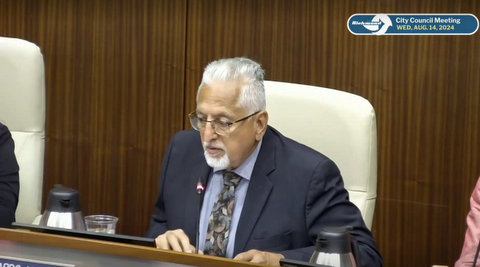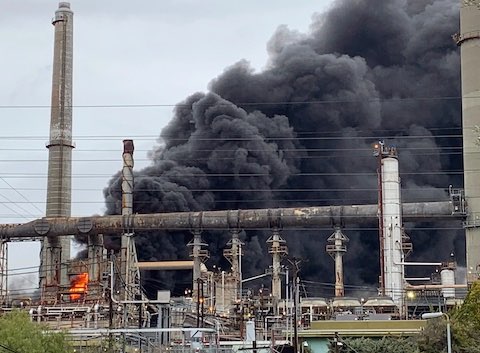
14 Aug Richmond Will Get $550 Million, Remove Refinery Tax From Ballot in Chevron Settlement

“This is a historic moment,” Mayor Eduardo Martinez said at a special meeting Wednesday where Richmond City Council agreed to a settlement that will net the city $550 million from Chevron. (Screenshot captured by Samantha Kennedy / The CC Pulse)
By Samantha Kennedy
The Richmond City Council unanimously approved a $550 million settlement with Chevron on Wednesday that staves off substantial potential litigation and removes the Richmond Refining Business License Tax from the November ballot.
Under the agreement, Chevron will make payments to the city for the next 10 years; $50 million per year for five years and then $60 million per year for five years. The money will go to the general fund.
“This is a historic moment because we — and when I say ‘we,’ I mean ‘we’ as the community of Richmond — have created a movement that will echo across the nation,” Mayor Eduardo Martinez said at a special council meeting. “What’s happened here has demonstrated…that when we as people pull together, we can create change.”
The agreement comes after language in the ballot measure last week was called “misleading” by a Contra Costa Superior Court judge, who called for the city to reword language for the ballot measure, according to the corresponding agenda report. Additionally, Chevron initially offered to pay $300 million in a tax settlement agreement, but the city negotiated that number up to the final figure of $550 million.
The ballot measure, which was expected to pass in November, was estimated to create $60 million to $90 million in revenue each year for 50 years for the city through a tax of $1 per barrel on refined oil. Like the settlement funds, revenue from the tax would have gone to the general fund, which is not limited in how money can be spent.
Supporters from the Asian Pacific Environmental Network and Communities for a Better Environment who first brought the tax to the council for a vote, were conflicted about the settlement and the tax’s removal from the ballot.
Kerry Guerin, an attorney with CBE who has remained confident the tax can survive legal challenges, asked council members at the meeting to reject the $550 million settlement and keep the measure on the ballot.
The tax would have generated more total revenue than the $550 million settlement, according to estimates, and was expected to begin lasting litigation between Chevron and the city, tying any revenue up from the tax. The agenda report points out that Carson, Calif., in Los Angeles County, has not been able to spend any revenue from its own refinery tax as it remains tied up in litigation. The tax in Carson, which is home to more than one refinery, was adopted in 2017.
Other supporters of the Richmond Refining Business License Tax acknowledged the impact that money from the settlement can have on the city but had hoped residents would have been able to have a say by voting on the ballot measure.
Money from the settlement is guaranteed and consistent, allowing the city to use it for any general government use without having to wait out the legal challenges the ballot measure tax likely would have brought.
“I think it is important that Richmond has a break of focus on rebuilding with guaranteed additional resources,” said council member Melvin Willis. “I’m also committed to having an advisory board. I want community members to be a part of our budgeting process.”
“I’m also looking towards another 10 years after the settlement because we need long-term sustainability,” he added.
McLaughlin and other council members credited APEN, CBE and other community members for being the driving force behind the agreement because of their continued advocacy to hold Chevron accountable.
“It is the strength of their tax measure that brought us to where we are at today,” McLaughlin said in acknowledging a yearslong push by the environmental groups. “Chevron came to the table because of their efforts.”
McLaughlin said she plans to bring an item to the Sept. 10 meeting that would allocate funding from the settlement to a just transition, which environmental groups like CBE and APEN have been working towards.
Richmond City Council will officially return from summer recess with its next regular meeting Sept. 10.






No Comments